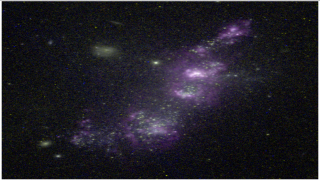Bibcode
Sánchez Almeida, Jorge; Montes, Mireia; Trujillo, Ignacio
Referencia bibliográfica
Astronomy and Astrophysics
Fecha de publicación:
5
2023
Revista
Número de citas
8
Número de citas referidas
5
Descripción
A recent paper reported the serendipitous discovery of a thin linear object interpreted as the trail of star-forming regions left behind by a runaway supermassive black hole (SMBH) kicked out from the center of a galaxy. Despite the undeniable interest in the idea, the actual physical interpretation is not devoid of difficulty. The wake of a SMBH produces only small perturbations in the external medium, which has to be in exceptional physical conditions to collapse gravitationally and form a long (40 kpc) massive (3 × 109 M⊙) stellar trace in only 39 Myr. Here we offer a more conventional explanation: the stellar trail is a bulgeless galaxy viewed edge-on. This interpretation is supported by the fact that its position-velocity curve resembles a rotation curve, which, together with its stellar mass, puts the object exactly on the Tully-Fisher relation characteristic of disk galaxies. Moreover, the rotation curve (Vmax ∼ 110 km s−1), stellar mass, extension, width (z0 ∼ 1.2 kpc), and surface brightness profile of the object are very much like those of IC 5249, a well-known local bulgeless edge-on galaxy. These observational facts are difficult to interpret within the SMBH wake scenario. We discuss in detail the pros and cons of the two options.
Proyectos relacionados

Grupo de Estudios de Formación Estelar GEFE
El proyecto interno GEFE está enmarcado en el proyecto coordinado, ESTALLIDOS, financiado por el plan nacional desde el año 2001. El ultimo proyecto aprobado es ESTALLIDOS 6.0 (AYA2016- 79724-C4-2-P). En el proyecto GEFE trabajamos en base al caso científico del proyecto ESTALLIDOS 6.0. Los estallidos de formación estelar (Starbursts o SB) son
Casiana
Muñoz Tuñón